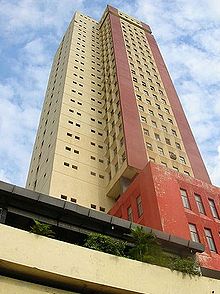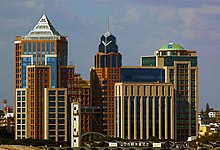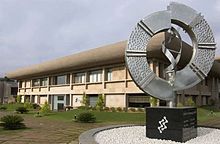Economy of Bangalore


Bengaluru (also known as Bangalore) evolved into a manufacturing hub for heavy industries such as Hindustan Aeronautics Limited, Indian Telephone Industries (ITI), Hindustan Machine Tools and Bharat Electronics Limited (BEL) after India gained independence from Great Britain in 1947. In the past three decades, the establishment and success of high technology firms in Bengaluru has led to the growth of Information Technology (IT) in India. IT firms in Bangalore employ about 35% of India's pool of 10 lakh (1 million) IT professionals and account for the highest IT-related exports in the country [citation needed].
The city's income gross domestic product in 2004-05 was valued at INR 433.8 billion.[1]
One of the important factors spurring Bengaluru's growth was heavy central government investment in Bengaluru's public sector industries, partially because it is geographically out-of-reach from India's rivals Pakistan and China. This led to the concentration of technical and scientific navigator in Bengaluru, and is a factor in leading the "IT revolution" in Bengaluru. Karnataka's political leaders such as D. Devaraj Urs, Ramakrishna Hegde, Gundu Rao, Veerappa Moily, J. H. Patel and S.M. Krishna each played a pivotal role in the development of Information Technology and Business Process Outsourcing (BPO) in Bengaluru. When R. K. Baliga, Founder of the Electronics City proposed the concept of developing the electronic city in the early 1970s it was met with skepticism but Chief Minister D. Devaraj Urs at that time supported him and approved the project. This initial seed investment by the Karnataka State Government in 1976 laid the foundation for the Electronics City.
Silicon Valley of India

The Silicon Valley of India is a nickname of the Indian city of Bengaluru. The name signifies Bengaluru's status as a hub for information technology (IT) companies in India and is a comparative reference to the original Silicon Valley, based around Santa Clara Valley, California, a major hub for IT companies in the United States. Bengaluru, however, is located on a plateau and not in a valley; the use of the term in reference to Bengaluru is not truly toponymous. One of earliest mentions of this sobriquet occurred in late 1980s in the Indian Express.[2] The more prevalent application of the nickname Bengaluru began in the 1990s[3] based on a concentration of firms specialising in Research and Development (R&D), electronics and software production.
The Electronics City was the brainchild of R. K. Baliga, the first Chairman and Managing Director Karnataka State Electronics Development Corporation, a government owned agency aimed at expanding the electronics industry in the state of Karnataka established in 1976. Baliga proposed the concept of developing the electronic city in the 1970s. The agency purchased 335 acres (1.36 km2) of land 18 km south of Bengaluru for its Electronics City project, which was meant to establish an industrial park in Bengaluru. Notwithstanding complaints by the industrial park's tenants on the condition of the roads, power and water availability, KEONICS claimed initially that the title of Silicon Valley of India belonged to the city's Electronics City campus.[3] As part of its promotion of this concept, KEONICS distributed reprints of an article entitled Can Bengaluru become India's Silicon Valley" that first appeared in "Plus: The Total Computer Magazine".
The article made references to studies of Bengaluru published by United States Agency for International Development (USAID) that favourably evaluated Bengaluru's capacity to grow into a high technology hub, similar to the Silicon Valley. The publication also published interviews with IT industry professionals on the state of the IT industry in Bengaluru and their perceptions of what lay ahead in the future. Selected quotes from the interviews included:
If the Centre looks at Bengaluru to be made into Silicon Valley, it would certainly become the Silicon Valley; If you are talking of a Silicon Valley kind of atmosphere, then Bengaluru already has it, but if you are talking of a product a day, then we are far from it; Bengaluru is certainly emerging as a software and R&D subcontracting centre for multinationals; It is not an unreasonable comparison to make between Bengaluru city and Silicon Valley; Bengaluru has the ingredients to become Silicon Valley... It is probably the only city in India that could become one.[3]
The turn of the millennium witnessed the growth of internet based technologies which resulted in the dotcom boom. Bengaluru's IT industry grew during this period with the establishment of local and foreign IT companies. In 2001, BusinessWeek published an article entitled "India's Silicon Valley" which traced the growth of the IT industry in India and particularly in Bengaluru. The use of the term "Silicon Valley of India" to refer to Bengaluru grew in local media and as time progressed, in international media too. An article entitled "Is the Next Silicon Valley Taking Root in Bangalore?" appeared in the New York Times in 2006[4] Indeed, some articles in the western media wondered if the original Silicon Valley would one day be functionally replaced by Bangalore[5]
Shashi Tharoor, has suggested that in place of the cliché of Silicon Valley of India, Silicon Plateau of India would be appropriate.[6]
Aerospace and Aviation industries

Bengaluru also called as aviation monopoly capital of India. It accounts India's more than 65% aerospace business. World Aerospace giants such as Boeing, Airbus, Goodrich, Dynamatics, Honeywell,GE Aviation, UTL,others have their R&D and Engineering centres.
Long before Bengaluru was called the Silicon Valley of India, the city made its name as headquarters to some of the largest public sector heavy industries of India. The Hindustan Aeronautics Limited (HAL) headquarters was based in Bengaluru, and was dedicated to research and development activities for indigenous fighter aircraft for the Indian Air Force. With over 9,500 employees, it is one of the largest public sector employers in Bengaluru.
Today, HAL manufactures, under license, various fighter aircraft for the Indian Air Force (IAF) including Sukhoi 30 Flankers and Jaguars. HAL also develops indigenous products for the IAF such as HAL Tejas, Aeronautical Development Agency, HAL Dhruv and HAL HF-24 Marut.
The National Aerospace Laboratories (NAL) is also headquartered in Bengaluru and is dedicated to the development of civil aviation technologies. Incorporated in 1960, NAL often works in conjunction with the HAL and has a staff strength of over 1,300 employees. NAL also investigates aircraft malfeasance.
A 1,000-acre (4.0 km2) special economic zone for the aerospace industry is being setup near the Bengaluru International Airport. Bengaluru is also home to large domestic airlines - Simplifly Deccan and Kingfisher Airlines.
Manufacturing Industries
Other heavy industries in Bengaluru include Bharat Electronics Limited, Bharat Heavy Electricals Limited (BHEL), Indian Telephone Industries (ITI), Bharat Earth Movers Limited (BEML), HMT (formerly Hindustan Machine Tools) and Hindustan Motors (HM).
Bengaluru is also becoming a destination for the automotive industry. Toyota has a manufacturing plant in Bengaluru while Daihatsu is planning on building a factory soon. Hindustan Motors also has a manufacturing facility in Bengaluru as does Volvo Trucks.
Bengaluru houses many small and medium scale industries in its Peenya industrial area that claimed to be one of the biggest in Asia 30-years ago.
Space technology
In June 1972, the Government of India set up the Space Commission and Department of Space (DOS). India's premier space research organization, the ISRO was created under the DOS and headquartered in Bengaluru. The main objective of ISRO includes development of satellites and launch vehicles. Aryabhata, India's first satellite, was developed and successfully launched by ISRO. Since then, the organization has successfully launched numerous other satellites such as Bhaskara, Rohini, APPLE, and the INSAT series, and successfully deployed PSLVs and GSLVs. ISRO also heads India's ambitious moon program.
Information Technology

Bengaluru is called the 'Silicon Valley of India' due to the large number of information technology companies located there. Many multinational corporations, especially computer hardware and software giants, have operations in Bengaluru.
Bengaluru's IT industry is divided into two main "clusters"[7]—Electronics City and Whitefield. New clusters in Bellandur and Challaghatta have emerged in the last few years along the Outer and Inner Ring Roads and in C. V. Raman Nagar near Old Madras Road.
Electronics City
Electronics City, located in the southern outskirts of Bengaluru, is an industrial park spread over 330 acres (1.3 km2). Electronics City was formed in 1978.[8] 3M, Hewlett Packard and Siemens are some of Electronic City's clients. Infosys and Wipro, India's second and third largest software companies, are headquartered in Electronics City. The Software Technology Parks of India, Bengaluru (STPI) was started at Electronics City in 1991 by the Ministry of Information Technology. STPI Bengaluru counts among the premier and oldest Internet Service Providers (ISP) in India. It was the first center to be Internet-enabled in India. Nortel Networks is a prominent client of STPI Bengaluru.
Whitefield
Whitefield cluster is home to the International Tech Park Bangalore. It was created as a result of a joint venture between India and Singapore in January 1994. It is a large facility, comprising 8 buildings—Discoverer, Innovator, Creator, Explorer, Inventor, Navigator and Voyager plus a building belonging to TCS. The ninth building which is under construction will be called "Avaitor". The Export Promotion Industrial Park Zone(EPIP) in Whitefield provides campus facilities for SAP, iGATE, Dell, TCS, Unisys, Delphi, Huawei, Oracle, Perot Systems. Captive centres of Tesco, Shell, Aviva, GM, Schneider Electric, GE, Goodrich / UTC aerospace and DaimlerChrysler are also located in Whitefield. Flowserve, a 100% subsidiary of Flowserve Corp(NYSE:FLS) also has a Manufacturing Plant and R&D center located in EPIP Area.
Other IT Parks
The Belandur - Marathahalli - Outer Ring Road cluster houses Accenture, Intel, Aricent, Symbol, Cadence, Cisco, EMC Corporation, Nokia, National Instruments, Honeywell, ARM, Cummins, JP MorganChase, Oracle, Logica CMG and i2 Technologies. It includes 7 IT parks such as RMZ Ecospace, Prestige tech park, Intel Park, Cessana SEZ, Vrinadavan IT Park, Global Technology Park and 3 Salarpuria IT Parks.
The Inner Ring Road cluster (Embassy Golf Links Business Park) near the HAL Airport in Challaghatta includes Dell, Microsoft, IBM, Yahoo, NetApp, McAfee, Bearing Point, Fidelity, ANZ, LG, Covansys, Synergy, PSI Data, Target, Misys, Dendrite, Sasken, BPL Sanyo, OpenSilicon, Xora and Lenovo.
Bagmane Tech Park located in C. V. Raman Nagar off Old Madras Road, houses Oracle (formerly i-flex Solutions), Motorola, Texas Instruments, Samsung, Dell, SanDisk, Cognizant and Volvo, among other companies.
Old Madras Road also hosts C-DAC,one of the premier Govt of India's IT R&D institute.
Manyata Technology Park is a SEZ (special economy zone) in Nagawara along the outer ring road where many MNCs have put office. IBM, Philips, NXP, Alcatel-Lucent, Nokia-Siemens, Cognizant Technology Solutions are some of the major companies in this area.
In August 2005, the Bengaluru Forum for IT (BFIT), which consists of 18 major multinational IT firms including Sun Microsystems, Texas Instruments, Philips, Novell, vMoksha, Synopsys, Hewlett-Packard and Motorola, threatened to boycott the Bengaluru IT convention. The proposed boycott was designed to indicate the displeasure of local and international technology companies with the city's lack of progress on the infrastructural front. Increasingly, new IT centers are being built away from this city due to long inner-city commute times, poor infrastructure, high land and labor costs, increasing environmental problems and labor retention issues.
Bangalore is also hub to many high-tech companies Infosys, Wipro, Tata Consultancy Services, Accenture and many others.
Biotechnology

Biotechnology is a rapidly expanding field in the city. Bengaluru accounts for at least 97 of the approximately 240 biotechnology companies in India. Interest in Bengaluru as a base for biotechnology companies stems from Karnataka's comprehensive biotechnology policy, described by the Karnataka Vision Group on Biotechnology.[9] In 2003-2004, Karnataka attracted the maximum venture capital funding for biotechnology in the country - $8 million. Biocon, headquartered in Bengaluru, is the nation's leading biotechnology company and ranks 16th in the world in revenues.
Institute of Bioinformatics and Applied Biotechnology (IBAB), initiated by Biotechnology vision group, ICICI and Biocon (located at ITPL) is trying to shape revolutionary scientists in the field.
Like the software industry which initially drew most of its workforce from the local public sector engineering industries, the biotechnology industry had access to talent from the National Center of Biological Sciences (NCBS) and the Indian Institute of Science (IISc).
And Indian Biotechnology Research Organisation (IBRO) is recently under process of development to boost Biotechnology Growth in India, providing the Advanced Research and Talent pool to India from IBRO, whose mission and vision is Research and Development in Biotechnology to make India as a Global Leader in Biotechnology.
Other Major Biotechnology company based out of Bengaluru is Advanta India.
Other industries
Bengaluru accounts for 70% of all rose exports from India and leads in floriculture business.[10] Karuturi Global Limited located in Bengaluru is world's largest grower of cut roses.[11]
Some of the other major companies headquartered in Bengaluru are:Canara Bank, United Breweries Group and GMR Group
A majority of the 3500 crore silk industry in India is headquartered in Karnataka State, particularly in the North Bengaluru regions of KOLAR, Muddenahalli, Kanivenarayanapura, and Doddaballapura the upcoming sites of a 70 crore "Silk City".[12] Muddenahalli-Kanivenarayanapura, in the outskirts of Bengaluru, are the sites of the upcoming Sri Sathya Sai Baba University and College of Medicine, Indian Institute of Technology Muddenahalli, and 600 crore Visvesvaraya Institute of Advanced Technology.[12][13][14] Devanahalli is set to be the site of a 9500 crore Devonahalli Business Park, near the Bengaluru International Airport.[15] These developments are set to contribute significantly to Bengaluru's economy by creating jobs, expanding educational opportunities, and spurring infrastructure.
See also
[Indian Biotechnology Research Organisation (IBRO) http://www.biotechnologyindia.org]
References
- ^ [1]
- ^ The Indian Express (Bengaluru Edition). 6 November 1988
- ^ a b c Heitzman, James. "Becoming silicon valley". India-seminar.com. 2001
- ^ Rai, Saritha. "Is the Next Silicon Valley Taking Root in Bangalore?". The New York Times. 20 March 2006
- ^ Morphy, Erika. "Bangalore Besting Silicon Valley?". 29 July 2004
- ^ Article in The Hindu
- ^ [2][dead link]
- ^ [3][dead link]
- ^ Bangaloreit.com
- ^ "Bangalore rakes in moolah this Valentine's Day". TNN. Times of India. 5 February 2002. Retrieved 24 November 2008.
{{cite news}}:|first=missing|last=(help) - ^ "Director's Report". Economic Times of India. Retrieved 24 November 2008. [dead link]
- ^ a b "Silk city to come up near B'lore". Deccanherald.com. Retrieved 21 December 2010.
- ^ "IIT will be established at Muddenahalli, says Moily". The Hindu. Chennai, India. 2 June 2009.
- ^ "International sports village location to be finalised soon". The Hindu. Chennai, India. 9 July 2009.
- ^ "Karnataka focuses on infrastructure development". The Hindu Business Line. 5 September 2009. Retrieved 21 December 2010.
External links
- The Official Website for The Indian Space Research Organisation
- The Official Website for Keonics
- http://www.keonics.com/infra_elecity1.htm
- Is Bangalore really a silicon valley? Comparison with the real Silicon Valley
- Bangalore: India's Hightech-Capital
- Bangalore cluster: Evolution, growth and challenges - An examination of the IT industry in Bangalore
- The Garment Industry in Bangalore
- The Official Website IBRO
